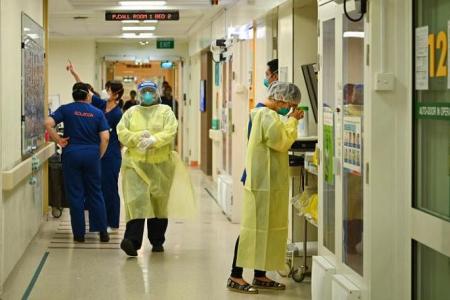Over 800 hospital beds to be set aside in Covid-19 fight, non-critical operations postponed
Hospitals here will set aside more than 800 beds in the next two weeks for Covid-19 patients, as Singapore grapples with an increase in cases brought on by the XBB strain of the Omicron variant.
Non-critical operations will be postponed as public hospitals prioritise their resources to cater to the needs of Covid-19 patients.
The Ministry of Health (MOH) said on Saturday that while hospitals are currently able to cope with the number of Covid-19 cases, it is important to preserve capacity, especially as cases continue to climb.
Singapore's director of medical services Kenneth Mak said the rise could potentially add stress to emergency departments.
"We therefore focus on managing the patient emergency departments so that we can assure that those who are seriously ill and require urgent care will continue to be properly treated," he added.
He said hospitals already have contingency measures in place. These include activating doctors and nurses in inpatient units to redeploy to emergency departments, as well as preparing more beds and holding spaces to cope with any increase in cases.
At present, the bed occupancy of hospitals stands at about 93 per cent, with 200 additional beds already activated.
As at Friday, there were nine cases in the intensive care units of hospitals, with more than 50 made available purely for Covid-19 cases, which Associate Professor Mak noted is adequate.
And 670 acute isolation beds have been set aside for Covid-19 cases, with current bed occupancy at just under 8 per cent, with another 100 beds to be made available across three public hospitals next week.
Although non-critical operations will be placed on the backburner, he stressed that doctors will triage patients accordingly and prioritise those with medical conditions that would deteriorate if immediate treatment is not rendered.
Some patients may even be transferred to other hospitals as part of this "load balancing strategy, to enable as many patients being able to receive timely care wherever possible".
Those who no longer need acute care may also be transferred to transitional care facilities in order to free up beds for more critical patients.
Meanwhile, Covid-19 patients recovering at home will also receive greater support through telehealth services - in which doctors and nurses will provide video consultations.
Coupled with the availability of oral antiviral medication, this would help patients recover while reducing the need for admission to hospitals.
Prof Mak said MOH would continue to monitor demand for beds in community treatment facilities and transitional care facilities, and make more available if required.
This announcement comes after the introduction of stricter measures in hospitals and residential care homes on Friday.
The tighter curbs on visitors to these places will continue until Nov 10, which MOH said were meant to protect healthcare capacity and the vulnerable during this period of rising cases.
In the hospitals, patients will be allowed two pre-designated visitors, and only one can be at the bedside at any one time.
Critically ill patients will be allowed up to five pre-designated visitors, of whom two can be at their bedside at any one time.
Each visit will be limited to 30 minutes, although this can be extended at the discretion of the hospital in the case of exceptional situations, such as for critically ill or paediatric patients.
Those in residential care homes may have up to four pre-designated visitors, and only one may be allowed at any one time for up to 30 minutes.
Visitors are encouraged to take an antigen rapid test on the day of their visits.
Get The New Paper on your phone with the free TNP app. Download from the Apple App Store or Google Play Store now


